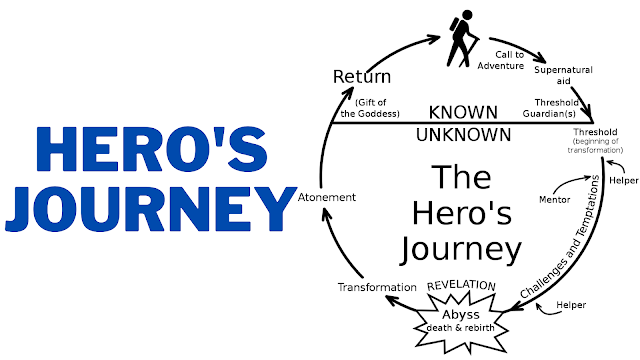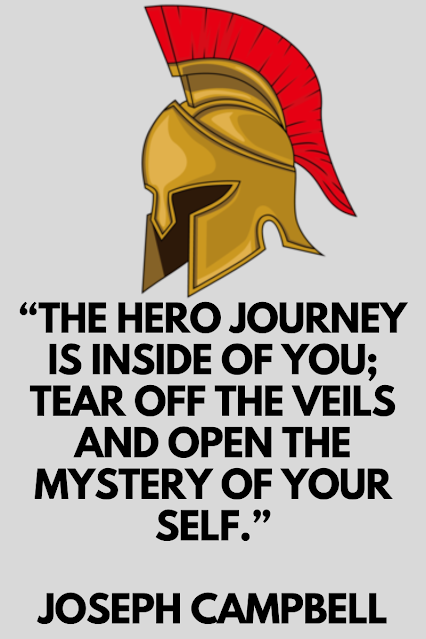Introduction Most people want to be respected. Few actually practice self-respect. And this is where the gap begins. The truth is simple but uncomfortable: people treat you the way you silently teach them to treat you. Not through words, but through tolerance, boundaries, and the standards you accept in everyday life. Respect is not something you demand. It is something you demonstrate—daily, quietly, and consistently. Self-respect is not about arrogance, dominance, or proving anything. It is about knowing your value and living in alignment with it. When you start doing that, people around you naturally adjust. Some step closer, some step away, but the treatment changes. Here are eight practical, non-negotiable ways to respect yourself that instantly shift how others see and treat you. Stop Looking for Those Who Aren’t Looking for You One of the most common forms of self-disrespect is chasing people who show n...
Introduction
The Hero's Journey is a timeless narrative pattern in myths, legends, and contemporary tales. It is a concept that outlines the steps that a hero must take to triumph over challenges and accomplish their objective. Learning about the Hero's Journey will assist you in becoming the hero of your story and accomplishing what you set out to do. In this section, we will discuss the Universal Structure of Great Stories and its 12 components and how you might apply those components to your work.The 12 Key Elements That Constitute the Universal Framework of Compelling Narratives
1. The Call to Adventure: The initial stage of the Hero's Journey involves receiving an invitation or summons to embark on a quest or adventure. This is when the hero is presented with a problem or challenge they must overcome. The hero may initially resist this call, but eventually, they will accept the challenge and embark on their journey.2. Refusal of the Call: The Hero may also refuse the call to adventure out of fear or a sense of duty to their current life. However, the hero will eventually realize that they cannot ignore the call and must take action.
3. Meeting the Mentor: Along the journey, the Hero will encounter a mentor who provides guidance and wisdom. The mentor can be a wise old sage, a helpful stranger, or a supernatural being.
4. Crossing the Threshold: The Hero must leave their ordinary world and enter a new and unfamiliar world. This can be a physical or metaphorical journey, but it's a significant step that marks the hero's commitment to their quest.
5. Tests, Allies, and Enemies: In this stage, the Hero will face tests and challenges. They will also encounter allies who can help them on their journey and enemies who will try to stop them.
6. Approach to the Inmost Cave: The Hero is getting closer to their ultimate goal, but they must face their greatest fear or challenge to move forward. At this crucial juncture in the narrative, the protagonist is faced with a pivotal moment that demands bravery and fortitude.
7. The Ordeal: The Hero faces their biggest challenge, which will test them physically and mentally. This is a make-or-break moment where the hero must confront and overcome their darkest fears.
8. Reward (Seizing the Sword): The Hero emerges from the ordeal victorious and obtains the reward they've been seeking. This can be a physical object, like a treasure or magical artifact, or an emotional bonus, the love and respect of others.
9.The Road Back: The Hero must return to their ordinary world, but their experiences change them. They may face new challenges on their journey home but are better equipped to handle them.
10. Resurrection: At this stage, the Hero faces a showdown with their enemy, where they must use everything they've learned to emerge victorious. This can be a literal or symbolic battle.
11.Return with the Elixir: The Hero returns to their ordinary world, but they bring back something valuable that can benefit themselves and others. This could be a physical object, like the Holy Grail, or a new sense of purpose and understanding.
12. Freedom to Live: The Hero is no longer bound by their previous limitations and can live freely and authentically. They have grown and transformed through their journey and are now the hero of their own story.
9.The Road Back: The Hero must return to their ordinary world, but their experiences change them. They may face new challenges on their journey home but are better equipped to handle them.
10. Resurrection: At this stage, the Hero faces a showdown with their enemy, where they must use everything they've learned to emerge victorious. This can be a literal or symbolic battle.
11.Return with the Elixir: The Hero returns to their ordinary world, but they bring back something valuable that can benefit themselves and others. This could be a physical object, like the Holy Grail, or a new sense of purpose and understanding.
12. Freedom to Live: The Hero is no longer bound by their previous limitations and can live freely and authentically. They have grown and transformed through their journey and are now the hero of their own story.


Comments
Post a Comment
Please do not add any spam link in the comment box